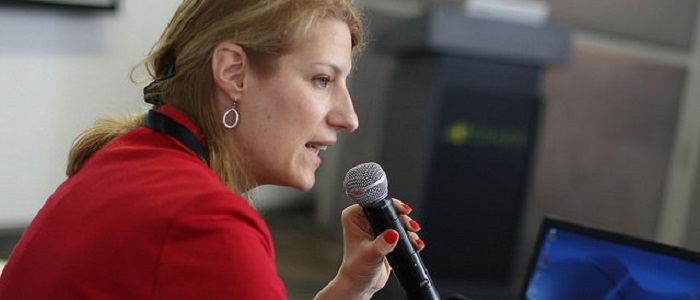
Five Questions with Ramona Angelescu Naqvi, Director of Programs at the Global Development Network (GDN). Ramona provides strategic oversight to the organization's research capacity building programs across the globe. She has written on global governance, migration and capacity building.
Q. GDN has a particular role in the world. How would you describe it?
A. GDN puts developing countries in the driver’s seat when it comes to their own development. It supports home grown solutions to the most pressing challenges, based on solid research and owned by local actors: academics, policy makers, civil society. GDN helps strengthen research capacity, where needed, for countries to shape their won development paths and for local researchers to work collaboratively with peers from around the world to share knowledge and produce evidence. We also put development research to better use.
Q. You have worked over ten years at GDN – how have you seen the organization change during this time?
A. GDN has tackled a variety of topics over the years, in line with the global development agenda, including growth and reform, migration, governance, public service delivery, urbanization and agriculture, to name a few. We have gradually expanded to all corners of the world, reaching over 130 countries, with an increasing focus in recent years on the poorest countries. GDN has also started working more with institutions, such as research centers and think tanks and universities, apart from teams of individual researchers. And naturally, over the years, we have tried to keep abreast of technology to animate our global network, to communicate research findings and to share and apply the knowledge generated by our grantees and partners.
Q. GDN recently launched a new strategy. What is the biggest message encapsulated in it?
A. The biggest message is that local research can, believe it or not, improve lives and have a lasting impact on local and global debates and policy-making. So, it deserves to be supported, financially and otherwise. Also, one size does not fit all. By that I mean: to support social science research in developing countries there are multiple complementary approaches that need to be considered, as well as trade-offs to be tackled, head-on. The new strategy outlines these key challenges and approaches.
Q. What are some of the biggest challenges in realizing the new strategy?
A. I'd say these are finding willing partners and funders, and versatile staff. GDN can only maintain its global reach, and realize the ambitions of the new strategy, with partners around the globe, across sectors and disciplines, and with adequate funding to support its grantees and add value to the services delivered. I say versatile staff because GDN, as a small international organization working across regions and themes, needs to be agile enough to organize a conference on Education in Spanish and English in Peru, as well as manage a program on Productivity or Competition Policy in Africa. Moreover, our staff must perform multiple roles, i.e., conceive programs, manage them, extract knowledge, write and present papers at conferences around the world, write blogs or opinion pieces, to give just a few examples.
Q. Tell us a GDN story that has inspired you all these years?
The stories that stay with me are, ultimately, about the human impact of our work. Without that, the work is less meaningful and less convincing. I can recall a story about a little boy in Nigeria, who aspires to be a doctor someday but whose family cannot afford the text books needed for him to follow his dream. He now receives free books as part of a scholarship program at school, thanks to a GDN supported study which showed that scholarships were a greater incentive for enrollment and retention, than a school feeding program. In fact, thanks to the study, the Scholarship Board in Greater Abuja endorsed it as the more successful policy to help improve access to education in the area.
Read more about GDN's work at www.gdn.int or see GDN's new strategy, The Road Ahead | Strategy 2017-2022
In conversation with Madhuri Dass, Head of Communications, Global Development Network, April, 2017.
